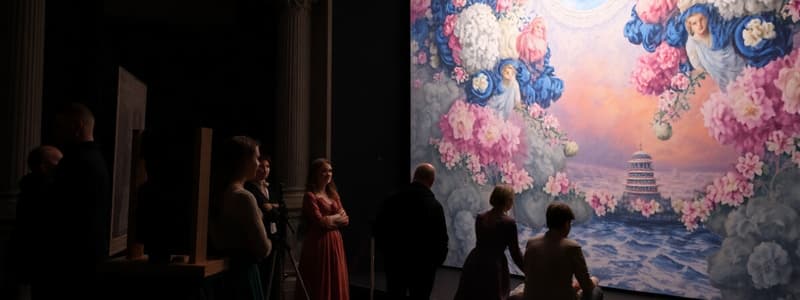Podcast
Questions and Answers
A props list is generally provided to the props and set dressing crew by the Producer.
A props list is generally provided to the props and set dressing crew by the Producer.
False (B)
Sub-assemblies in staging help to reduce both the number of components needed for transport and the time required for assembly on-site.
Sub-assemblies in staging help to reduce both the number of components needed for transport and the time required for assembly on-site.
True (A)
Stage construction is only necessary for indoor theatre productions.
Stage construction is only necessary for indoor theatre productions.
False (B)
Visual systems are primarily utilized in theatre productions.
Visual systems are primarily utilized in theatre productions.
Detailed component and parts lists are unnecessary for the disassembly of staging elements.
Detailed component and parts lists are unnecessary for the disassembly of staging elements.
Props for larger productions are sourced exclusively from prop rental businesses.
Props for larger productions are sourced exclusively from prop rental businesses.
Costumes are often marhalled in one location to ensure all items are accounted for before transport.
Costumes are often marhalled in one location to ensure all items are accounted for before transport.
Larger theatres typically require all their sound equipment to be transported from an external location.
Larger theatres typically require all their sound equipment to be transported from an external location.
The bump-out process entails dismantling sets and stages while considering future storage needs.
The bump-out process entails dismantling sets and stages while considering future storage needs.
Music concerts require all lighting equipment to be sourced from the venue's existing lighting systems.
Music concerts require all lighting equipment to be sourced from the venue's existing lighting systems.
Study Notes
Production Crew and Specializations
- Production crews vary in size from a few members to large, specialized teams in technical areas.
- Specialized departments include stage construction, set construction, props, lighting, sound, and visual systems.
Staging Elements Preparation
- Staging elements are designed, built, or sourced from storage/rental for productions.
- Assembly drawings are provided, detailing all components needed to assemble stages and sets at venues.
- Sub-assemblies are used to simplify transport by grouping components, speeding up on-site assembly, and reducing risks of missing pieces.
Props and Set Dressing
- Props crew uses a 'props list' from the Director and set designer for larger productions, sourcing items from storage, prop makers, rental businesses, purchases, and loans.
- Props and set dressings are gathered in one location, checked off against the list, packed, and prepared for transport.
Costume Department Logistics
- Costumes may be made, rented, or sourced from storage, similar to props.
- Costumes are also marshalled in one location with a checklist before packing for transport.
Technical Equipment Transport
- Determining whether sound and lighting equipment needs to be brought in depends on the venue's existing systems.
- Larger theatres often have in-house lighting, while outdoor concerts require all equipment to be transported, including power desks, lights, and sound systems.
Bump-In and Bump-Out Process
- The bump-out process mirrors bump-in but involves dismantling sets.
- Factors affecting bump-out include: relocating elements for the same production, storage considerations, different destination locations (e.g., rental business), and tighter timelines compared to bump-in.
Studying That Suits You
Use AI to generate personalized quizzes and flashcards to suit your learning preferences.
Description
Explore the various specializations within a production crew, detailing the roles involved in stage and set construction, props preparation, and costume logistics. This quiz highlights the importance of collaboration and organization in the successful execution of productions.




